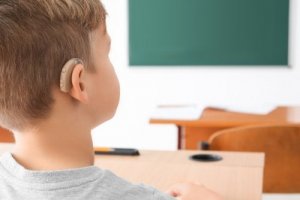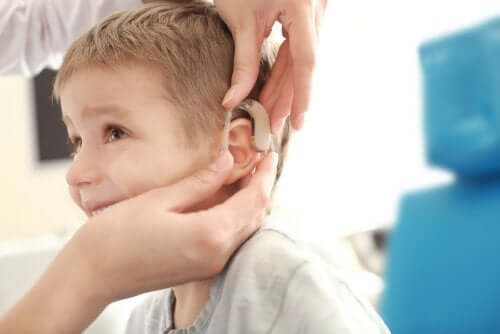Learning in Children with Hearing Impairment

Parents and teachers play a fundamental role in the education of children with hearing impairment. Early detection and knowledge of the degree of the impairment are key to the child’s development.
Hearing impairment includes hearing loss and profound deafness. Hearing loss can vary in degree and affect one or both ears. Profound deafness is a hearing impairment greater than 90%.
Both conditions affect cognitive skills and socialization in different ways. However, it’s possible for children with these conditions to learn enough motivation and adaptation.
How to encourage learning in children with hearing impairment
Lack of hearing can become an obstacle to language acquisition. However, at an intellectual level, these children are just like the rest. The important thing is to offer them the necessary tools for them to gain knowledge.
Stimulate residual hearing
People with hearing loss have residual hearing, which allows them to gain knowledge audibly. Stimulating it at home, at school, and with audiologists yields very positive results.
Provide a communication system early on

Right from the moment of detection, it’s very important to start a system of oral communication or sign language. Knowledge and the ability to communicate with others enhances children’s cognitive and social development.
Complement with other systems
Learning in children with hearing impairment can be slower and cause frustrations.
Thus, integrating complementary systems has proven to be very beneficial in this regard. Such measures allow children to know and understand values, rules, and even language itself. In addition, it avoids isolation from their friends and companions.
Develop reading comprehension skills
Schoolchildren greatly improve their cognitive skills through reading and writing. The sense of sight is one of children’s best allies in this regard. They reach a level of autonomy that makes them self-confident and boosts their self-esteem. They can also access the information they need on their own.
Curricular adaptation
In schools, the first step is curricular adaptation for learning in children with hearing impairment. Although they’re going to learn the same content, the learning strategies and methods vary. Speech therapy, technology, and other tools are also used to encourage integration.
Technological devices for people with hearing impairment
There have been great advances in the field. Experts can help families decide the best technology for their children. Some digital hearing aids only amplify the deficiency. With them, it’s possible for people with hearing impairment to hear almost like people who don’t suffer from it.
Other hearing aids recover a percentage of hearing. Internal implants and other products seek to improve the quality of life of hearing-impaired people. In any case, it’s necessary to discover which one is the best fit for your child.
Sign language
Access to learning sign language is also a great measure. Often, it’s the only way for these children to acquire a communication system. It’s essential for the entire family to participate in this process. You need to also try out complementary systems.

Families are responsible for learning in children with hearing impairment
Family is the foundation for happy learning in children with hearing impairment. The priority is to become aware of the disability and act quickly. The family’s active participation ensures rapid and fruitful progress.
People with hearing loss may have trouble speaking. If the child doesn’t receive personalized instruction, his cognitive development may be directly affected. However, he can reach the same intellectual level as people without hearing impairment with help.
Experts can also help correct delays in the acquisition of certain knowledge. Therefore, you must be patient and adapt your environment for your child.
To achieve the expected benefits, you must seek help from professionals and encourage socialization. It’s important for children with hearing impairment to be confident in themselves and their abilities.
Parents and teachers play a fundamental role in the education of children with hearing impairment. Early detection and knowledge of the degree of the impairment are key to the child’s development.
Hearing impairment includes hearing loss and profound deafness. Hearing loss can vary in degree and affect one or both ears. Profound deafness is a hearing impairment greater than 90%.
Both conditions affect cognitive skills and socialization in different ways. However, it’s possible for children with these conditions to learn enough motivation and adaptation.
How to encourage learning in children with hearing impairment
Lack of hearing can become an obstacle to language acquisition. However, at an intellectual level, these children are just like the rest. The important thing is to offer them the necessary tools for them to gain knowledge.
Stimulate residual hearing
People with hearing loss have residual hearing, which allows them to gain knowledge audibly. Stimulating it at home, at school, and with audiologists yields very positive results.
Provide a communication system early on

Right from the moment of detection, it’s very important to start a system of oral communication or sign language. Knowledge and the ability to communicate with others enhances children’s cognitive and social development.
Complement with other systems
Learning in children with hearing impairment can be slower and cause frustrations.
Thus, integrating complementary systems has proven to be very beneficial in this regard. Such measures allow children to know and understand values, rules, and even language itself. In addition, it avoids isolation from their friends and companions.
Develop reading comprehension skills
Schoolchildren greatly improve their cognitive skills through reading and writing. The sense of sight is one of children’s best allies in this regard. They reach a level of autonomy that makes them self-confident and boosts their self-esteem. They can also access the information they need on their own.
Curricular adaptation
In schools, the first step is curricular adaptation for learning in children with hearing impairment. Although they’re going to learn the same content, the learning strategies and methods vary. Speech therapy, technology, and other tools are also used to encourage integration.
Technological devices for people with hearing impairment
There have been great advances in the field. Experts can help families decide the best technology for their children. Some digital hearing aids only amplify the deficiency. With them, it’s possible for people with hearing impairment to hear almost like people who don’t suffer from it.
Other hearing aids recover a percentage of hearing. Internal implants and other products seek to improve the quality of life of hearing-impaired people. In any case, it’s necessary to discover which one is the best fit for your child.
Sign language
Access to learning sign language is also a great measure. Often, it’s the only way for these children to acquire a communication system. It’s essential for the entire family to participate in this process. You need to also try out complementary systems.

Families are responsible for learning in children with hearing impairment
Family is the foundation for happy learning in children with hearing impairment. The priority is to become aware of the disability and act quickly. The family’s active participation ensures rapid and fruitful progress.
People with hearing loss may have trouble speaking. If the child doesn’t receive personalized instruction, his cognitive development may be directly affected. However, he can reach the same intellectual level as people without hearing impairment with help.
Experts can also help correct delays in the acquisition of certain knowledge. Therefore, you must be patient and adapt your environment for your child.
To achieve the expected benefits, you must seek help from professionals and encourage socialization. It’s important for children with hearing impairment to be confident in themselves and their abilities.
All cited sources were thoroughly reviewed by our team to ensure their quality, reliability, currency, and validity. The bibliography of this article was considered reliable and of academic or scientific accuracy.
- educacionespecial.sep.gob. (2016). Educación especial en discapacidad auditiva. Extraído de: https://www.educacionespecial.sep.gob.mx/2016/pdf/discapacidad/Documentos/Atencion_educativa/Auditiva/3discapacidad_auditiva.pdf
- Ministerio de Eudación. (2016). Guía sobre discapacidad auditiva. Extraído de: http://especial.mineduc.cl/wp-content/uploads/sites/31/2016/08/GuiaAuditiva.pdf
This text is provided for informational purposes only and does not replace consultation with a professional. If in doubt, consult your specialist.








